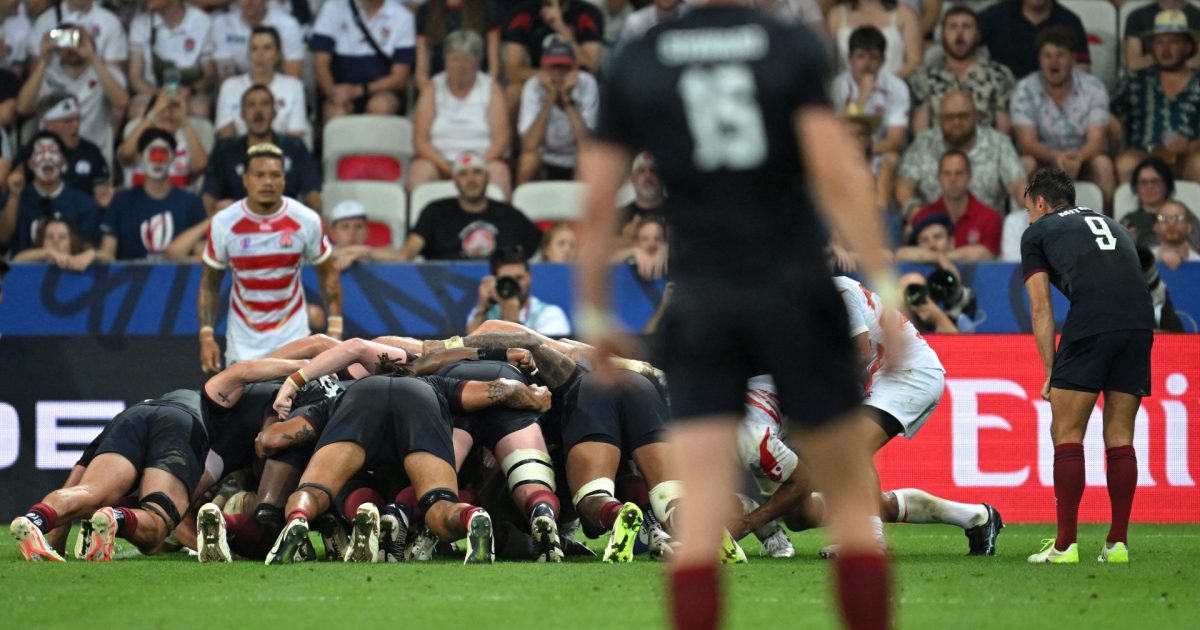England explain how they have turned around their wobbling scrum

England scrum coach Tom Harrison has expressed his delight that there has been positive progress at the set-piece two games into the Rugby World Cup compared to the platform head coach Steve Borthwick inherited from Eddie Jones.
The English were described as one of the worst scrums around when Jones was sacked last December and while progress was slow over the course of the Guinness Six Nations, the summer appointment of Harrison as an assistant coach has provided the platform for them to accelerate their improvement.
After confirming on Tuesday that the squad currently has a fully clean bill of health heading into next Saturday’s match versus Chile in Lille, including Freddie Steward who has overcome the dead leg that saw him limp off near the end of last Sunday’s 34-12 win over Japan in Nice, Harrison told a media briefing in Le Touquet-Paris-Plage about the change that has been afoot at the scrum.
“The scrum is in a good place,” he began, warming to his specialist subject. “There is still room for improvement. We have had 33 scrums so far in the tournament, the most of any team. We have conceded one penalty so in that sense it has been really clean.
“The step forward for us is how we build more pressure with our scrum, especially when we have got teams under the pump. How do we actually get a reward out of it?”
The improvement has been a meeting of minds, with Harrison explaining that is always picking the brains of the players. “100 per cent. Steve does the lineout guys, Richard (Hill) does the back row and I’m working with the front row and I make sure I’m picking their brains. The product we put out is a shared product amongst the staff and the players.”
If just one penalty has been conceded by the England scrum, how many have been won so far in the matches against Argentina and Japan in recent weeks? “We have won four on our own ball, four or five. You will see a trend having spoken to the officials, the ball is coming out.
“In terms of teams that are wanting to scrummage for penalties, it’s becoming difficult in the way the current trend of referees. If the ball is playable the ball is playable so we’re hearing that if the ball is playable at the back of the scrum and the offence is not clear and obvious, then the ball will be asked to be used rather than potentially a penalty given… we are working with that to make sure we are technically clean so that dominance can be rewarded.”
So explain why England were getting it so wrong in the recent past at the set-piece? “The scrums that go crouch, bind, set and bang and you hit it, flash, bang and it hits the floor, if that happens then you are inviting the referee to come in and go, ‘We’ll guess’.
“So you look back and you go okay, pre-Steve coming in, the penalties that were won or lost for England were before the ball came in, so you were putting the complete outcome of the scrum into the referee’s hands or the AR’s hands.
“What we have worked for is get to the contest and then go forward in the contest and what I mean by contest is make sure the ball comes in and then we can have a contest, then we can be judged on our performance rather than just having a 50/50. So we have worked really hard on being balanced and controlled in our set-up to allow us to have a good engagement and then go to work to in a contest.
“We have to train different scenarios to make sure we are balanced in what we do so we can remove, and I use this in a respectful manner, the referee being forced to potentially not make a decision that is 100 per cent because he is only refereeing what he sees. So it is making sure that we are technically clean so that we can win penalties.”
Whereas Argentina and Japan were both teams that England had faced as recently as last November’s Autumn Nations Series before France 2023, minnows Chile are a step into the unknown. “There is a fair amount, the USA games,” explained Harrison about the footage available on the South Americans.
Owen Farrell is available for England selection on Saturday versus Chile in Lille and he had No10 rival George Ford in his same winning foot/head tennis team at Tuesday training, from Liam Heagney in Le Touquet-Paris-Plage ? #ENGvCHI #RWC2023 #EnglandRugby pic.twitter.com/HPYz0Xoe1V
— RugbyPass (@RugbyPass) September 19, 2023
“They played an Argentina XV in a warm-up twice, they also played Namibia. We have full respect and we have done a full deep dive into them to gain an understanding of how to best prepare the team, best prepare the scrum this weekend.
“It’s exciting for us to experience a new challenge. They are new to the World Cup obviously; they have been brilliant in the matches they have played. You have seen that a lot with the tier two, how well they have started matches, how they have competed has been impressive.”

























































If the ref's do not allow dominant scrums to hold the ball in to achieve a penalty the Bok's are going to struggle to get the same field dominance they have in the past
Fascinating. I love getting more details like this. Also, enjoy hearing Tom Harrison when he is interviewed.